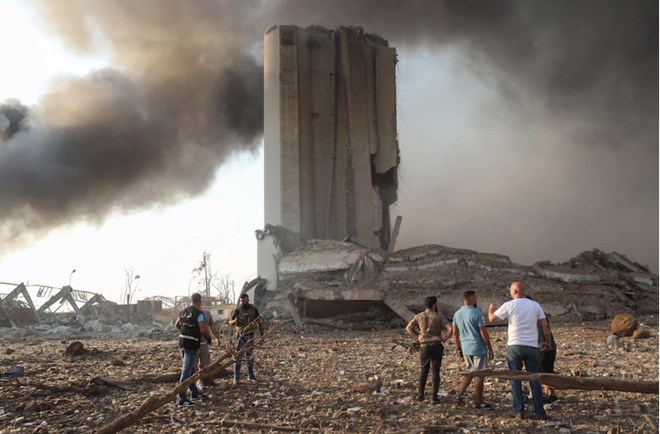
Tuesday August 4, 2020

People gather by damaged buildings after a pair of explosions in Beirut on Aug. 4, 2020. (Hasan Shaaban/Bloomberg News)
BEIRUT — At least two massive explosions shook Beirut on Tuesday, injuring and killing hundreds of people, strewing devastation across multiple neighborhoods and shattering windows for miles around.
The cause of the late afternoon blast was not immediately clear, but senior officials said it appeared that flammable materials stored in a warehouse had caught fire. An earlier, smaller explosion had apparently ignited a fire, then came two secondary blasts, propelling a vast mushroom cloud of pink and yellow smoke over the city.
The casualty toll rose through the evening. The health ministry put the latest toll at 70 dead and over 3000 injured.
Hospitals were overwhelmed by the number of injuries. One, the Hotel Dieu, said it had received over 500 injured people in the first hours after the blast. For more than an hour after the explosion, people with blood streaming down their faces or limbs wandered the streets trying to find a way of reaching hospitals on roads too clogged with traffic and debris for ambulances and taxis to move.
The explosion coincides with mounting tensions between Israel and the Lebanese Shiite militia Hezbollah, which maintains a facility at the port and has long been accused by U.S. officials of using it to smuggle weapons into the country. The explosion follows a series of mysterious blasts at Shiite militia storage sites in Iraq last year that Iraqi and Israeli officials have said Israel was responsible for, and more recently a string of similarly unexplained explosions at military sites and power stations in Iran.
An Israeli official, who spoke on the condition of anonymity because he was not authorized to speak to reporters, denied that Israel had any role. Israeli Defense Minister Benny Gantz and Foreign Minister Gabi Ashkenazi offered the Lebanese government medical and humanitarian aid, as well as immediate emergency assistance, via international intermediaries because Israel and Lebanon are in a state of war and have no contact.
In a statement offering condolences to families of the dead and injured, Hezbollah did not apportion blame. It called the incident a “huge national tragedy” and urged Lebanese to unite to overcome the ordeal.
There were many indications the blast may have been a tragic accident. Lebanese Interior Minister Mohammed Fahmi said it appeared stocks of ammonium nitrate, a fertilizer that can be used in bombmaking, had ignited.
Lebanon’s Prime Minister Hassan Diab linked the explosions to dangerous stocks of chemicals that had been stored at the port since 2014, despite warnings from port officials that the material was not safe.
“I promise you that this catastrophe will not pass without accountability. ... Those responsible will pay the price,” he said in a televised speech. “Facts about this dangerous warehouse that has been there since 2014 will be announced and I will not preempt the investigations.”
But suspicions lingered that Israel may have been involved, said a senior Lebanese army officer who spoke on the condition of anonymity because the issue is sensitive. Numerous witnesses reported hearing warplanes overhead at the time, he noted.
“There are suspicions,” the official said. “There will be no conclusion until there has been a full investigation.
Israeli planes and drones have been spotted flying with increasing regularity over the city in recent weeks as the tensions have risen.
One thing that was clear is that crisis-stricken Lebanon, in the throes of a major financial and economic collapse and battling rising numbers of coronavirus infections, is in no position to cope with another disaster, especially on this scale. At least two hospitals were badly damaged in the explosions, and TV footage showed staff evacuating patients to alternative hospitals that were themselves swamped — in the dark, because the city had no electricity.
Among the dead was Nizar Najarian, a senior official with the Kataeb political party. The injured included Kamal Hayek, the chairman of the state-owned electricity company, according to the state-run National News Agency.
Germany’s foreign ministry tweeted that German embassy employees were among those injured. Phone lines went down, and the internet faltered as friends and relatives took to the telephone to check on loved ones.
Many residents lost their homes, especially in the majority Christian eastern part of the city closest to the blast. In the neighborhood of Gemmayze, once a vibrant nightlife district, buildings collapsed, cars were overturned and the streets were blocked by piles of masonry and twisted metal.
The Red Cross told all ambulances across the country to head to Beirut to report for duty.
Health authorities also warned that the explosion had left a toxic cloud of nitrous oxide hanging over the city, and told residents to wear masks and stay indoors.
The damage was spread across a wide arc. Windows were blown out and check-in counters were damaged at Beirut’s airport, several miles from the explosion. Doors were blown open and windows rattled at the U.S. Embassy, more than 6 miles away.
Buildings collapsed and cars were overturned in the neighborhood of Gemmayze, a popular nightlife area and one of the worst hit neighborhoods.